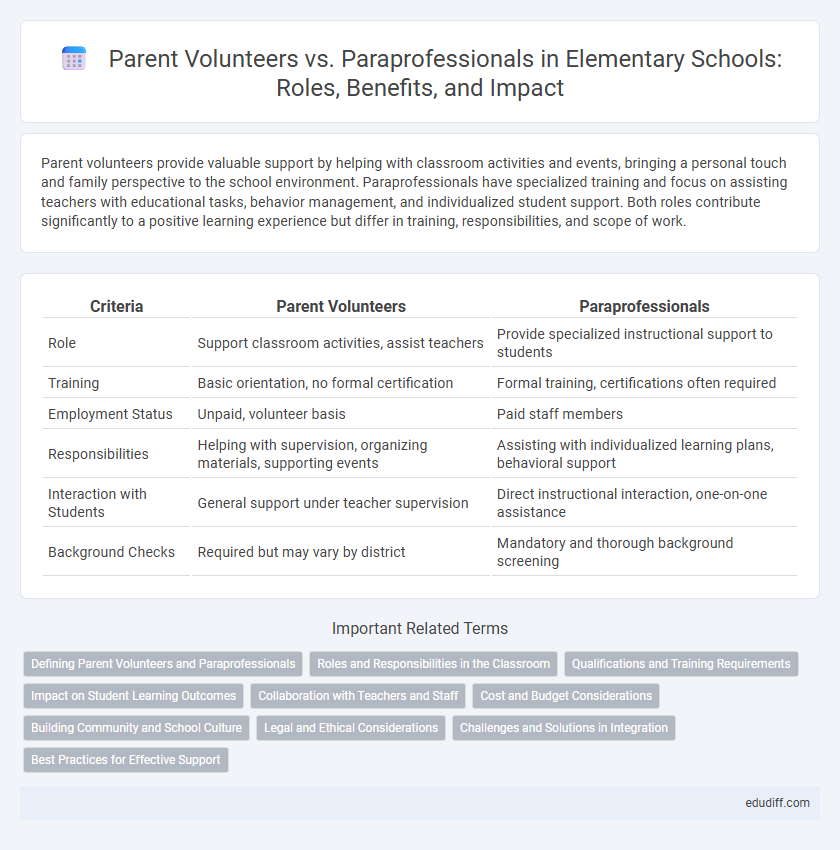Parent volunteers provide valuable support by helping with classroom activities and events, bringing a personal touch and family perspective to the school environment. Paraprofessionals have specialized training and focus on assisting teachers with educational tasks, behavior management, and individualized student support. Both roles contribute significantly to a positive learning experience but differ in training, responsibilities, and scope of work.
Table of Comparison
| Criteria | Parent Volunteers | Paraprofessionals |
|---|---|---|
| Role | Support classroom activities, assist teachers | Provide specialized instructional support to students |
| Training | Basic orientation, no formal certification | Formal training, certifications often required |
| Employment Status | Unpaid, volunteer basis | Paid staff members |
| Responsibilities | Helping with supervision, organizing materials, supporting events | Assisting with individualized learning plans, behavioral support |
| Interaction with Students | General support under teacher supervision | Direct instructional interaction, one-on-one assistance |
| Background Checks | Required but may vary by district | Mandatory and thorough background screening |
Defining Parent Volunteers and Paraprofessionals
Parent volunteers are family members who offer their time and skills to support classroom activities and school events without formal training or employment status. Paraprofessionals are trained educational assistants employed by schools to provide instructional support and help manage classroom duties under teacher supervision. Both play essential roles in enhancing the elementary school learning environment but differ in training, responsibility, and formal involvement.
Roles and Responsibilities in the Classroom
Parent volunteers support classroom activities by assisting with reading groups, organizing materials, and helping during special events, fostering a positive learning environment. Paraprofessionals have specialized responsibilities such as delivering targeted instruction, managing behavior interventions, and supporting students with individualized education plans (IEPs). Both roles are crucial but differ in training and scope, with paraprofessionals providing professional educational support and parent volunteers offering supplementary assistance.
Qualifications and Training Requirements
Parent volunteers in elementary schools typically have no formal qualifications or mandated training, relying on their willingness to assist in classroom activities and school events. Paraprofessionals undergo specific training and often require certifications such as a ParaPro Assessment or an associate degree in education-related fields to support teachers effectively. This structured preparation ensures paraprofessionals possess the skills to provide academic and behavioral support, differentiating their role from that of parent volunteers.
Impact on Student Learning Outcomes
Parent volunteers contribute to student learning outcomes by providing individualized attention and fostering a supportive classroom environment, which enhances student engagement and motivation. Paraprofessionals offer specialized instructional support and assist with behavioral management, directly improving students' academic performance and social skills. Both roles are essential, with paraprofessionals delivering targeted interventions and parent volunteers enriching classroom dynamics, collectively boosting overall student achievement.
Collaboration with Teachers and Staff
Parent volunteers contribute to elementary classrooms by supporting teachers with tasks like organizing materials and assisting small groups, fostering a collaborative environment. Paraprofessionals work directly with teachers and students, offering specialized instructional support and helping implement individualized education plans (IEPs). Both roles enhance the learning experience through teamwork, but paraprofessionals often engage more deeply in educational strategies and student development.
Cost and Budget Considerations
Parent volunteers provide valuable support in elementary classrooms at no direct cost, offering a budget-friendly resource for schools. Paraprofessionals require salaries and benefits, which can significantly impact school budgets but bring specialized skills and consistent assistance. Balancing the cost savings of volunteers with the professional expertise of paraprofessionals is crucial for effective budget planning in education.
Building Community and School Culture
Parent volunteers and paraprofessionals each play vital roles in building community and fostering a positive school culture at the elementary level. Parent volunteers bring diverse family perspectives and strengthen home-school connections through active involvement in classroom activities and events. Paraprofessionals provide consistent academic and social support, enhancing student engagement and promoting an inclusive, supportive learning environment.
Legal and Ethical Considerations
Parent volunteers in elementary schools must adhere to school policies and confidentiality agreements to protect student privacy under FERPA regulations. Paraprofessionals require formal training and certification, ensuring compliance with IDEA for supporting students with disabilities while maintaining ethical standards in educational support. Both roles involve strict boundaries to prevent conflicts of interest and uphold a safe, respectful learning environment.
Challenges and Solutions in Integration
Parent volunteers often face challenges in understanding formal educational protocols and managing their time effectively, while paraprofessionals encounter difficulties balancing instructional support with individualized student needs. Implementing targeted training programs and clear communication channels enhances collaboration and efficiency between parent volunteers and paraprofessionals. Establishing defined roles and ongoing feedback mechanisms further supports smooth integration and optimizes student learning outcomes.
Best Practices for Effective Support
Clear communication and defined roles enhance collaboration between parent volunteers and paraprofessionals in elementary schools. Parent volunteers support classroom activities and provide additional attention, while paraprofessionals deliver specialized instructional assistance and behavioral support. Establishing consistent training and regular feedback ensures both groups contribute effectively to student learning and well-being.
Parent Volunteers vs Paraprofessionals Infographic

 edudiff.com
edudiff.com